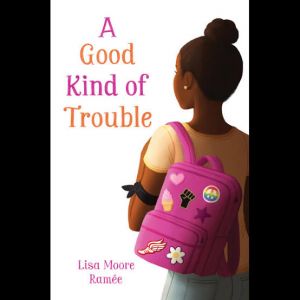A Good Kind of Trouble by Lisa Moore Ramée
The writer Lisa Moore Ramée comes up with this funny and big-hearted debut middle grade novel about friendship, family, and standing up for what’s right, perfect for fans of Angie Thomas’s The Hate U Give and the novels of Renée Watson and Jason Reynolds. [1]
Summary
Shayla Willows and her best friends Julia and Isabella make up the “united nations.” Shayla is African-American, Julia is Japanese-American and Isabella is Puerto Rican--three girls from different racial backgrounds but alike in everything that really matters. At least that’s what they’ve always thought. [2]
She is allergic to trouble. All she wants to do is to follow the rules. (Oh, and she’d also like to make it through seventh grade with her best friendships intact, learn to run track, and have a cute boy see past her giant forehead.)
But in junior high, it’s like all the rules have changed. Now she’s suddenly questioning who her best friends are and some people at school are saying she’s not black enough. [3]
Shay’s sister, Hana, is involved in Black Lives Matter, but Shay doesn't think that's for her. After experiencing a powerful protest, though, Shay decides some rules are worth breaking. She starts wearing an armband to school in support of the Black Lives movement. Soon everyone is taking sides. And she is given an ultimatum.
Shay is scared to do the wrong thing (and even more scared to do the right thing), but if she doesn't face her fear, she'll be forever tripping over the next hurdle. Now that’s trouble, for real.[4]
Pros
One of the reviewer from online site said that Ramée effectively portrays the importance of the Black Lives Matter movement and the difficulty of navigating complex social situations while conveying universal middle school questions about friendship, first crushes, and identity. Shay’s journey is an authentic and engaging political and personal awakening.”[5]
This book was so wonderful when Shayla’s gradual development from a passive rules follower to a young lady ready to stand up and speak out for what she believes in. It was very realistic and makes the payoff of Shayla refusing to remove her armband very satisfying. Ramee uses universal experiences like dealing with changes in friendships and navigating first crushes to build Shayla’s confidence in speaking up for herself and making her voice heard. [6]
References
- ↑ https://books.google.co.id/books/about/A_Good_Kind_of_Trouble.html?id=7AJVDwAAQBAJ&source=kp_book_description&redir_esc=y
- ↑ https://www.lisamooreramee.com/books
- ↑ https://www.goodreads.com/book/show/38251243-a-good-kind-of-trouble
- ↑ https://www.foggypinebooks.com/store/p171/9780062836687.html#/
- ↑ https://www.amazon.com/Good-Kind-Trouble-Moore-Ram%C3%A9e/dp/0062836684
- ↑ https://blogs.slj.com/heavymedal/2019/10/15/a-good-kind-of-trouble-by-lisa-moore-ramee/

